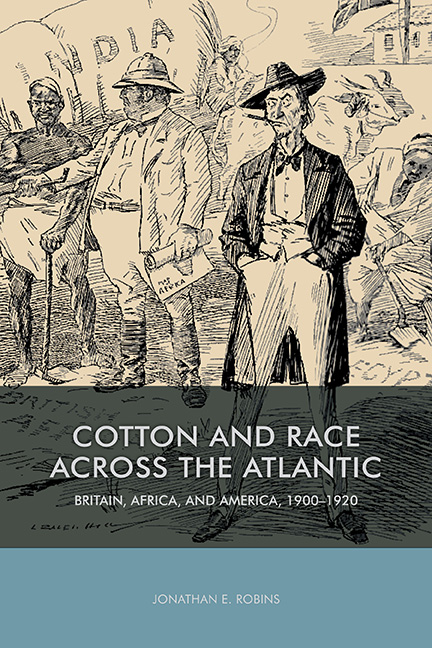Book contents
- Frontmatter
- Contents
- List of Illustrations
- Preface
- Abbreviations
- Introduction
- 1 The Cotton Crisis: Lancashire, the American South, and the Turn to “Empire Cotton”
- 2 “The Black Man's Crop”: The British Cotton Growing Association and Africa
- 3 “The Scientific Redemption of Africa”: Coercion and Regulation in Colonial Agriculture
- 4 “King Cotton's Impoverished Retinue”: Making Cotton a “White Man's Crop” in the American South
- 5 Cotton, Development, and the “Imperial Burden”
- Notes
- Bibliography
- Index
3 - “The Scientific Redemption of Africa”: Coercion and Regulation in Colonial Agriculture
Published online by Cambridge University Press: 13 July 2019
- Frontmatter
- Contents
- List of Illustrations
- Preface
- Abbreviations
- Introduction
- 1 The Cotton Crisis: Lancashire, the American South, and the Turn to “Empire Cotton”
- 2 “The Black Man's Crop”: The British Cotton Growing Association and Africa
- 3 “The Scientific Redemption of Africa”: Coercion and Regulation in Colonial Agriculture
- 4 “King Cotton's Impoverished Retinue”: Making Cotton a “White Man's Crop” in the American South
- 5 Cotton, Development, and the “Imperial Burden”
- Notes
- Bibliography
- Index
Summary
All the colonial powers discovered that African farmers usually did not choose cotton when offered a choice of cash crops. Development planners, like those at the BCGA, found that producers abandoned cotton in favor of less labor-intensive or more lucrative crops whenever they gained access to world markets hungry for tropical commodities. Colonial rulers then had three options: they could give up on cotton, they could compel Africans to grow cotton, or they could try to make cotton competitive with other crops. The BCGA officially focused on the latter strategy, but British and other European colonial officials used all three options at different times and places. Local contexts, rather than overarching metropolitan visions, ultimately determined where and how cotton export industries developed in Africa. As Anne Phillips argued, “colonial policies necessarily developed in response to a complexity of local constraints.”
Outright coercion has been the best-studied aspect of “cotton colonialism” in Africa, but overt force was used sporadically and refl ected the failure of the colonial state to exercise authority through less costly mechanisms. Colonial powers learned early on that forced cultivation was inefficient and expensive. Refl ecting on the German experience in Togo, KWK director Moritz Schanz admitted that “there are no means in existence to force them to a cultivation of any certain product, although the Government authorities may express the wish and use some infl uence in getting the natives to grow that product which is most necessarily required by the mother country” (emphasis in the original). Sven Beckert and Andrew Zimmerman have both demonstrated how German policy toward cotton drifted between the poles of freedom and compulsion. Despite their belief in theories of scientific racism, German officials were unable to justify the use of forced labor for cotton growing. Compulsion was inefficient, expensive, and engendered outright resistance to colonial regimes. As a result, German as well as British and French planners used force alongside more subtle policies of propaganda, taxation, regulation, and surveillance to push Africans into cotton growing and to ensure cotton was cultivated in the manner Europeans wanted. As Europeans realized that the prices they could offer for cotton were not attractive to African farmers, they focused on making African cotton competitive by increasing yields and improving quality. These efforts invariably required more labor and were rarely well received by farmers.
- Type
- Chapter
- Information
- Cotton and Race across the AtlanticBritain, Africa, and America, 1900–1920, pp. 116 - 164Publisher: Boydell & BrewerPrint publication year: 2016



